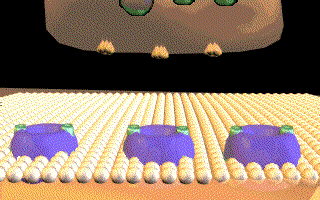
![]()
The Action of Alcohol in the Brain
Silvia Helena Cardoso, PhD
e Renato M. E. Sabbatini, PhD
André Luis Malavazzi (art and animation)
 |
 Add
Alcohol Add
Alcohol |
Ethanol affects different cerebral neurotransmitters among them the gamma-aminobutyric acid (GABA). GABA neurotransmitter is stored in synaptic vesicles inside the neuron. As vesicles move to cell membrane they release its contents to synaptic cleft (gap where an electrical signal jumps from one neuron to another). GABA crosses the gap and binds to GABA receptor which is coupled to a chloride channel (ions with negative charges) and associated to a benzodiazepinic receptor. When a GABA molecule couples with its receptor, it results in an increase in the opening frequency of chloride channels, therefore making more chloride enter the cell. The cells fire less allowing a greater flow of this ion to the intracellular medium, making it more negative, and thus promoting neuronal hyperpolarization. After a while, the GABA comes off the receptor and is removed from the sinapse by reuptake pumps that return it to the first neuron.